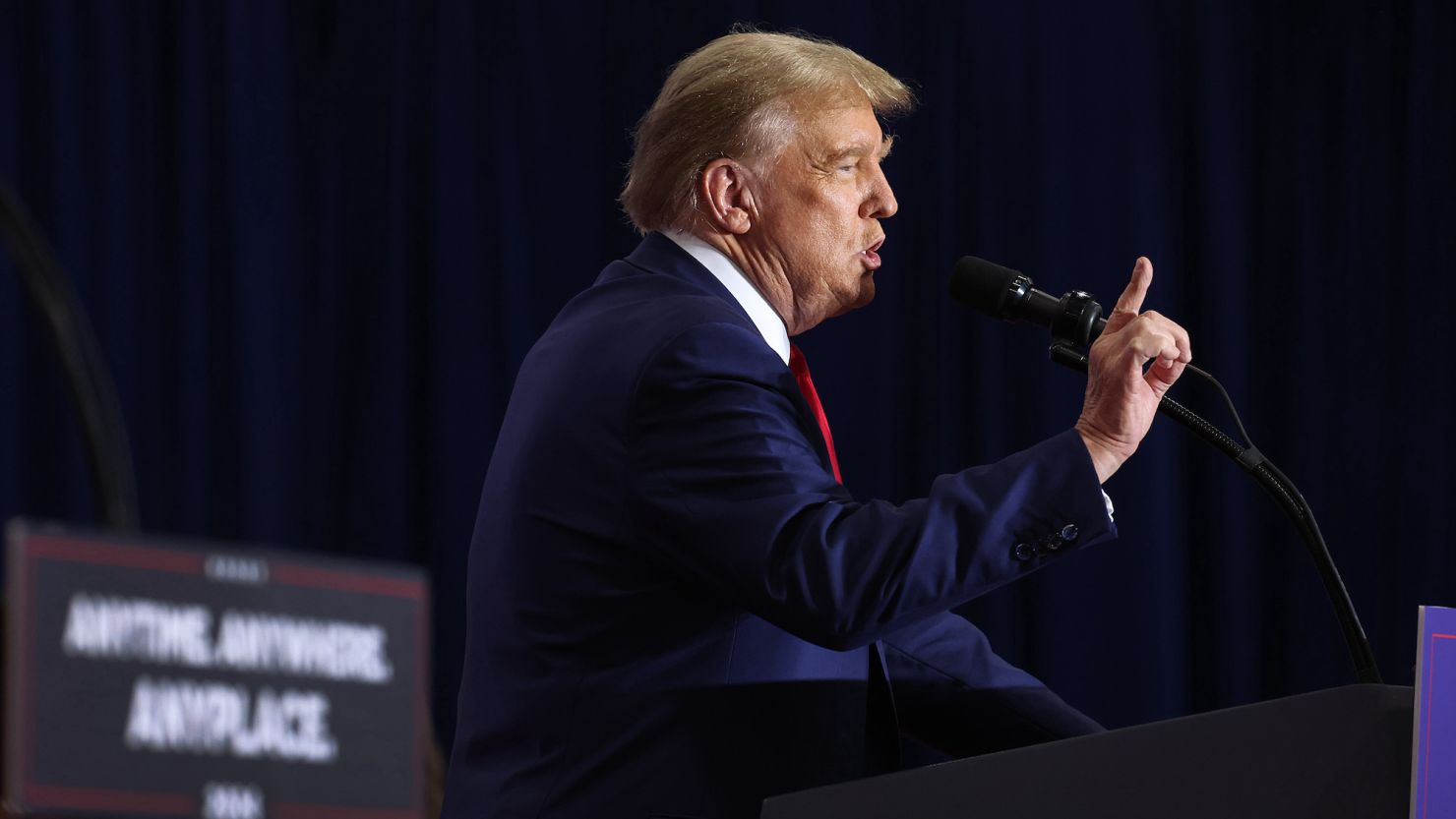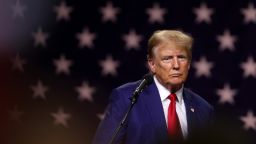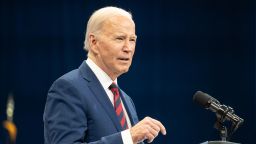Donald Trump made an unexpected declaration Tuesday when probed about a six-week abortion ban that will soon take effect in his home state of Florida.
“We’ll be making a statement next week on abortion,” the former president told reporters in Grand Rapids, Michigan.
The offhand remark put his team on the clock to weigh in on one of the most delicate and contentious issues in American politics. It came as news to some within his campaign, which only hours earlier released a statement on the Florida law, voicing vague support for “preserving life” and states’ rights.
Since launching his third bid for the White House, Trump has struggled to reckon with the political fallout from the overturning of Roe v. Wade, a sea change in the country’s abortion policy brought on by his makeover of the US Supreme Court. For much of the Republican primary, Trump avoided the topic, and when he did weigh in, he sometimes angered anti-abortion leaders by criticizing the rush of new restrictions from members of his party in response to the landmark decision.
Now, as he stares down an election against a Democratic rival eager to pin on him every pregnancy horror story stemming from new state-level abortion restrictions, Trump is inching toward taking a public stance on an issue he privately refers to as a “political loser.” He has spent weeks in conversations with advisers and friends discussing an approach while some of his top policy aides have quietly drafted the contours of a position that will attempt the seemingly impossible: embracing one of the most contentious legacies of his first term without risking a chance at a second one, according to multiple conversations with Trump’s advisers and allies.
Still unclear is where he’ll end up. Trump recently floated the 15-week threshold as one “people are agreeing” to, and he has privately batted it around since last year. At other times, he has also said states should decide.
It’s a policy some long-time allies have recently encouraged Trump to get behind, including one of his top former advisers, Kellyanne Conway. Over dinner on the patio of Mar-a-Lago last month, Conway urged him to publicly support federal abortion legislation with a specific threshold into a pregnancy to restrict access to the procedure, according to one source familiar with the encounter. In response to a request for comment, Conway told CNN, “I don’t push President Trump to do anything.” South Carolina Sen. Lindsey Graham and Faith and Freedom Coalition leader Ralph Reed have offered similar advice in their meetings with Trump.
“I told him, if you want to bring people together, which he talks about doing, well what would do that? I mean, where’s the sort of sweet spot? And I think that’s what he’s thinking about. The sweet spot, just from polling, is 15, 16 weeks,” Graham told CNN in an interview. “He talks about trying to bring the country together and form a consensus. Well, when you look and see where the consensus is at, [a 15- or 16-week ban] is where it’s at.” (Polls typically show a majority of Americans support access to abortion in all or most cases, though they are open to some restrictions depending on how the question is asked.)
Other close advisers, however, have expressed concern that Trump will give further ammunition to Democrats by supporting any new restrictions on abortion. This week, President Joe Biden’s campaign launched an advertising blitz in swing states featuring a clip of Trump saying he was “proud” to have “terminated” Roe v. Wade.
Some allies have suggested to Trump it would be politically prudent to punt the fight over reproductive rights to the states.
Still, in the hours since Trump’s surprise pronouncement Tuesday, many on his team have acknowledged that it has become untenable to remain vague on the issue as Democrats make it the centerpiece of their White House defense and countless races across the country. The effort was further complicated this week, when the Florida Supreme Court greenlit a November ballot referendum that will allow voters there – including Trump, a resident of the Sunshine State – to decide whether abortion access should be enshrined in the state constitution.
“It was bound to happen at some point where he needed to clarify his position,” a Trump adviser told CNN. “The Democrats are making a big point of making abortion what they’re gonna go after us on. So it’s clear at some point he would need to spell out exactly where he stood on the issue.”
“It’s either do it now or later. I think, from a PR standpoint, it’s probably better to do it now,” the adviser added.
Trump waffles on his position
For months, Trump and his advisers have offered vague answers on abortion as they worked to find a path forward on an issue that he has uncomfortably danced around for the past year.
The former president told Fox News last month he would be making a decision “pretty soon” on supporting a national abortion ban, adding, “I would like to see if we could make both sides happy.”
Days later, he floated a 15-week ban in another appearance on conservative media.
“I’m thinking in terms of that, and it’ll come out to something that’s very reasonable,” Trump told the New York radio show “Sid & Friends in the Morning.”
Both times, Trump’s remarks caught his campaign off guard, according to multiple conversations with his advisers, who at first downplayed the former president’s comments, insisting that they had no plans to roll out policy addressing abortion any time soon.
However, behind the scenes, Trump’s top policy aides, led by Vincent Haley and Ross Worthington, have been quietly working on a memo tackling the issue, a source familiar with their work told CNN.
Haley and Worthington also had discussions with some outside allies, including Conway, to advise on the issue, the source said.
“Throughout the last year and a half, she’s been pushing either a federal ban or urging him to come out and support Lindsey Graham’s original bill,” one of the sources said about Conway. Graham’s bill, first filed shortly after the Supreme Court overturned Roe v. Wade nearly two years ago, calls for abortion to be banned at 15 weeks, which he claims is when a baby can feel pain, with exceptions to protect the life of the mother, and if the woman becomes pregnant through rape or incest.
Anti-abortion groups, including Susan B. Anthony Pro-Life, have also intensified their pressure on Trump. Leaders of these groups have argued that the community that helped get him elected in 2016 needs to know where he stands and he should publicly make clear what type of policy he would support, according to a source familiar with the conversations.
Privately, Trump has debated with allies on an approach to abortion and at times has appeared torn. He has suggested support for a national ban while also giving lip service to letting states decide – conflicting positions that reflect the disparate counsel he is receiving.
On Tuesday, before Trump weighed in from Michigan, his campaign spokesman Brian Hughes had already issued a statement on Florida’s six-week ban that noted the presumptive Republican nominee “supports preserving life but has also made clear that he supports states’ rights because he supports the voters’ right to make decisions for themselves.”
The politics of abortion
Trump has struggled to articulate where he stands since first jumping into the GOP race for president in 2015.
He frequently tells those close to him that he believes the issue is a “political loser” for Republicans, particularly in a general election, and he called Florida’s six-week ban “a terrible mistake” on similar grounds. Speaking to religious broadcasters and Christians at an event in Nashville, Tennessee, in February, he told the room that when it comes to the issue of abortion, “You have to get people elected.”
Yet, Trump regularly takes credit for the overturning of Roe v. Wade after appointing three conservative justices to the Supreme Court while serving as president.
“The fact I was able to terminate Roe v. Wade after 50 years of trying. They worked for 50 years — I’ve never seen anything like it. They worked, and I was even, I was so honored to have done it,” Trump said during a CNN town hall last year. “We are in a very good negotiating position right now only because of what I was able to do.”
Throughout the Republican presidential primary — when many of Trump’s opponents were coming out with firm positions supporting a national ban — Trump was frequently pushed by anti-abortion allies, including Graham, Reed and SBA Pro-Life President Marjorie Dannenfelser, to vocalize where he stood on the issue. During a meeting at Mar-a-Lago last May, the three encouraged him to embrace a 15-week ban, CNN previously reported.
Even some of Trump’s advisers at the time told him he would ultimately need to support such a measure or face backlash from conservative voters, particularly in Iowa, where Florida Gov. Ron DeSantis was courting the state’s evangelical community by running to Trump’s right on the issue. Trump refused – driven by his own political instincts and a desire to avoid an electoral landmine after the nominating contest.
But once Trump secured the GOP nomination, his advisers changed their tune. While they thought embracing an abortion ban could help him in the primary, they now believe doing so in a general election would hurt more than help with key voting blocs, such as suburban women, according to conversations with several of Trump’s top advisers.
It was Trump who surprised his aides by suddenly expressing a willingness to take a firmer position, but what that is remains to be seen.







